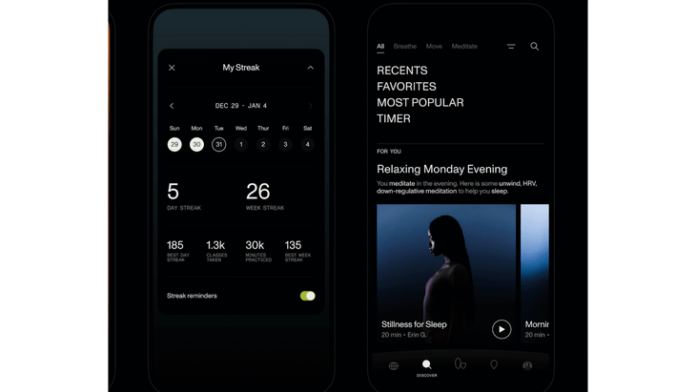“], “filter”: { “nextExceptions”: “img, blockquote, div”, “nextContainsExceptions”: “img, blockquote, a.btn, a.o-button”} }”>
Heading out the door? Read this article on the new Outside+ app available now on iOS devices for members!
>”,”name”:”in-content-cta”,”type”:”link”}}”>Download the app.
Everywhere you turn, someone is reminding you to unplug from technology and connect with yourself. That advice isn’t wrong. It’s estimated that 200 million people on the planet currently practice meditation, a number that has tripled in the past decade thanks, in part, to our understanding of the almost tangible calm and ease that it brings and the related benefits. Yet these two pursuits—mindfulness and technology—no longer need to be mutually exclusive given more than 2,500 meditation apps were launched in the last decade, according to a recent report.
Problem is, it’s become increasingly challenging to sort through the noise and find an app that delivers the specific sort of emotional regulation, clarity, and focus you seek, whether you’re managing anxiety or simply trying to fall asleep. So we’ve done the work for you.
We asked 13 people—a mix of meditation teachers, newbies, and everyone in between—to try an array of popular apps. Of the 25 highly rated meditation apps we tried, only seven consistently induced a sense of calm afterward. The others left us frustrated by clumsy navigation, exclusive pricing, and other mood-altering annoyances, including constant ads.
Interested in trying a little assisted meditation? The following meditation apps are the ones our testers found most efficient for quieting thoughts and plugging into themselves.
Best Meditation Apps At a Glance
All mats in this guide were tested by multiple reviewers. When you buy through our links, we may earn an affiliate commission. This supports our mission to get more people on their mats. Learn more.
Best Meditation Apps by Category
Biggest Splurge (And Worth It)
O-p-en
Get the App
⊕ Easy to navigate
⊕ New practices curated daily in each category—breathe, move, meditate
⊕ Diversity among teachers and styles
⊕ High production value
⊗ Lack of meditations longer than 20 minutes
⊗ Pricey
Cost: $20/month or $150/year
If any meditation app could be considered sexy, it’s O-p-en. With its sleek aesthetic and insightful quote moving across the screen, you’re instantly transported to a place of calm, whether you’re here to meditate, breathe, or move. From there, it’s a cinch to find a practice that aligns with what you’re seeking—whether you need to sleep, focus, or release.
In addition to its exceptional array of content, the app offers an almost IMAX-like experience with its exquisite production value. As one online commenter noted, “I’m not religious but that was church.” We’re not disagreeing. Most meditations clock in around 10 minutes. There’s a lack of longer-form practices, with most maxing out at 15 minutes, although if what you need is quick relief, this app manages to remind you how simple it can be.
According to the app, it seeks to “Bridge science and spirituality to evolve body and mind.” Tester and yoga teacher D. Javi Vason appreciated its attempts toward that. She also noted the diversity of teachers leading the content. “There are so many different voices, accents, and personalities that come through in the meditations,” she says.
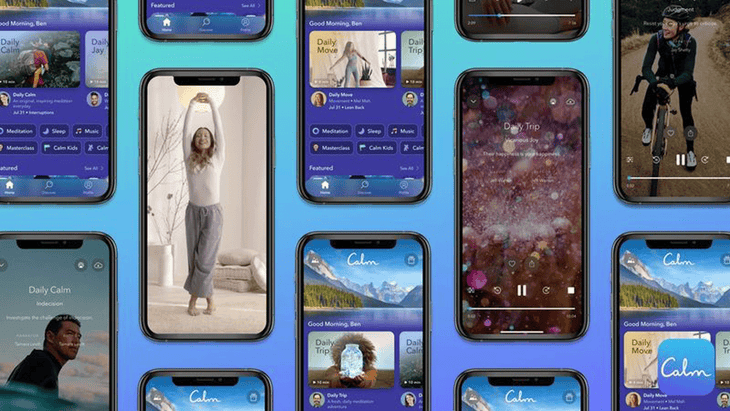
Most Calming
Calm
Get the App
⊕ Extensive library with subcategories
⊕ Celebrity guided sleep stories
⊕ Wide variety of suggestions based on your daily mood assessment
⊕ Highly diverse teaching roster
⊗ Relatively pricey
⊗ Library of sleep meditations slim compared to other categories
⊗ Cluttered interface and difficult to navigate
Cost: $14.99/month or $69.99/year
In recent years, Calm has often been referred to as the “number one app for sleep and meditation.” We can understand why. The moment you click on the app, you’re invited to take a deep breath as a calming indigo backdrop and the soothing sound of crickets and a mountainous moonscape greet you. The practices you’re presented with range from meditations to insights, such as the Daily Jay, which offers wisdom from best-selling author and podcast host Jay Shetty.
More than anything, tester Justin Ayers was impressed by Calm’s depth and the “large library of daily meditations with sub-categories such as sleep, anxiety, stress, self-care.” Users experience a lot of autonomy as they interact with the app, including selecting how audible the background sound should be. Ayers also appreciated the app’s customized format, which enables you to select practices geared for “beginners, specific mental struggles, sleep, and finding your breath.” That pretty much includes everyone.
Despite all the features, Ayers was uncertain if he would pay for the app given its relatively high cost compared to some apps. You’re provided a search bar with prompts such as “Harry Styles” and “anxiety,” but little other instructions for meditators in terms of what to seek. The app’s neverending options may seem overwhelming to navigate if you prefer order and guidance. Also, the personalized recommendations can sometimes feel random and obscure.
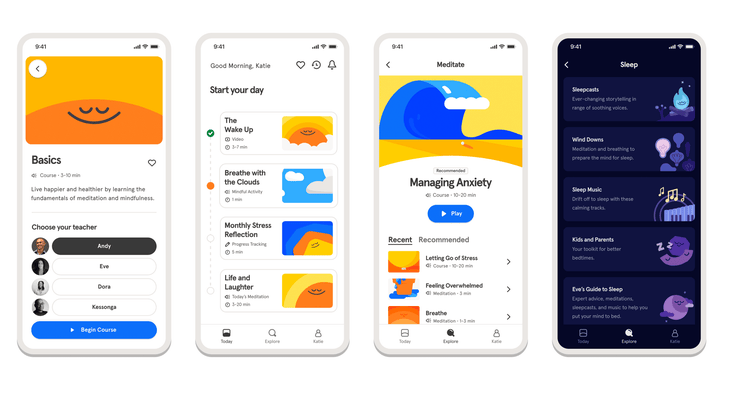
Most Specific Meditations
Headspace
Get the App
⊕ Hip design and interface
⊕ Diverse roster of teachers
⊕ Vast library includes moving meditations
⊗ Limited free library and costly in-app purchases
⊗ Lots of advertisements and cross-promotions
⊗ Lacks longer sessions
Cost: $12.99/month or $69.99/year
Headspace is a longtime meditation app that’s boasted partnerships with Netflix and Meta and recently expanded to offer access to virtual reality. The app is easy to navigate and its design includes winsome illustrations in vibrant hues, including oranges and yellow on the homepage and more sedate purple hues on their sleep sections.
It allows you to choose the situation you’re currently seeking to address, whether “Sleep soundly” or “Manage anxiety” or “Practice meditation.” If you choose meditation, more than 500 options await. Since availing herself of its practices, one of our testers, Pattie Ficcorilli, quickly went from meditating just a few times a week to becoming a daily meditator.
Another unique and rather valiant aspect of Headspace is it works with a variety of insurance companies and workplaces to help cover the cost. It also offers free memberships to teachers and supporting staff and discounted or free rates for students.
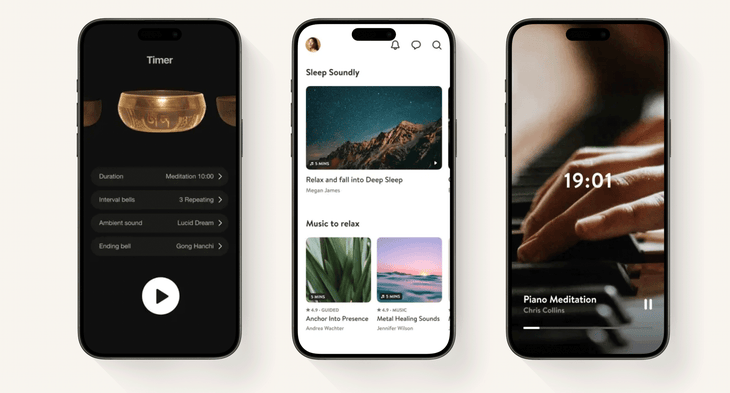
Most Helpful Free App
Insightful Timer
Get the App
⊕ Free version offers ample options
⊕ Variety of content beyond meditation
⊕ Frequent challenges encourage community-building and consistency
⊗ Must upgrade to paid to rewind or fast-forward meditations
⊗ Information and option overwhelm
⊗ Difficult to search by teacher
Cost: Free; In-app upgrade $9.99/month or $59.99/year
Arguably the most well-known meditation app, Insight Timer has remained a leader since its launch in 2009, even as endless alternatives have become available. The app opens with a quick quote before immersing you in its diverse library featuring meditations of all lengths as well as journal prompts, stories, courses, lectures from psychologists, soothing music, and more.
Those who tried Insight Timer years ago will find the familiar iconic singing bowl logo to be the same although other aspects of the app have evolved, including the sheer amount of content available on it. There are currently more than 220,000 free features available on the app. An in-app upgrade to Plus membership includes even more meditations as well as music and mindful movement.
For many past users, one of the favorite parts was, and continues to be, being able to look at the community page and see how many people around the world are meditating alongside you. It’s sorta like having virtual accountability partners around the globe. Also, live events enable you to connect with teachers and fellow meditators IRL.
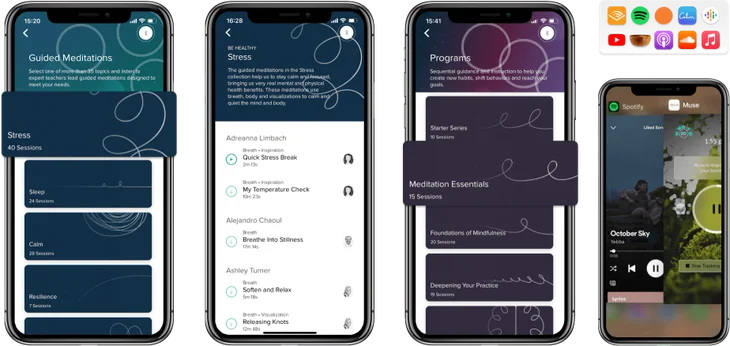
Most High-Tech Biofeedback App
MUSE
Get the App
⊕ Interesting meditation categories for a variety of communities and life stages
⊕ Syncs with Apple Health app
⊕ Self-assessment tools to help you track your overall well-being
⊗ Headband required for full biofeedback experience
⊗ Tech can be glitchy and there are frequent updates
Cost: $12.99/month or $94.99/year
MUSE is unique among meditation apps in that users have the option of donning brain sensing headbands to track their biofeedback during sessions. Even without the extra gear and technology, MUSE is intuitive and easy to navigate and includes a robust library of meditation options.
Tester Jodie-Ann Muckler tried it without the headband and appreciated “the different styles and lengths” of meditations as well as the specific offerings for “quarter life, entrepreneurs, and other populations.” Although Muckler found the app to include a diverse roster of teachers in terms of gender and race, they suggested adding more content from queer and/or trans communities.
If you rely on the biofeedback hardware, you can track your body’s autonomic processes, including brain waves, breath rate, and heart rate as a means of learning to attune your thoughts with your physiological response.
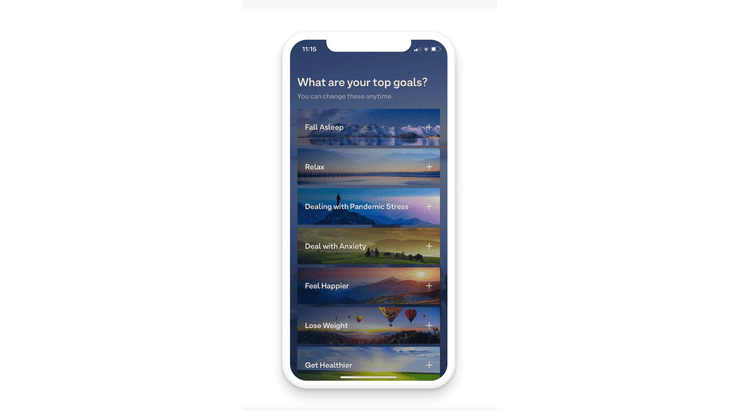
Most Breathwork-Focused
Breethe
Get the App
⊕ Easy to navigate
⊕ Pleasing interface
⊕ Option to play or remove music during meditations
⊕ Alternative therapies available
⊗ Lack of diversity amongst teachers
⊗ Short quizzes providing potential mental health diagnoses can be dangerous without a support team
⊗ No captions for deaf or hearing-impaired meditators
⊗ Few meditations longer than 20 minutes
Cost: $12.99/month or $89.99/year
With its ease of use, reliance on AI, and aesthetically pleasing vibe, Breethe works hard to remove the “to-do list” dreariness from your meditation practice.
“It’s simple yet beautiful, with lots of nature and color,” describes tester Hailey Kinter. “When you open the app, beautiful music plays so you relax even while searching for a desired meditation, which sometimes can feel stressful if I’m exhausted from making decisions.”
Kinter, who is a yoga teacher in palliative care, especially appreciated how the app might appeal to people with chronic illnesses and/or disabilities, “There were a whopping 52 different meditations for pain,” she says. “Breethe also has 15-plus meditations for chronic pain, chronic illness, and chronic fatigue.” There’s also a hypnotherapy component, which is unique among most meditation apps.
The AI option to help select the right meditation for you is a godsend if you’re experiencing decision-fatigue, which can easily set in given the large library of meditations of varying lengths.
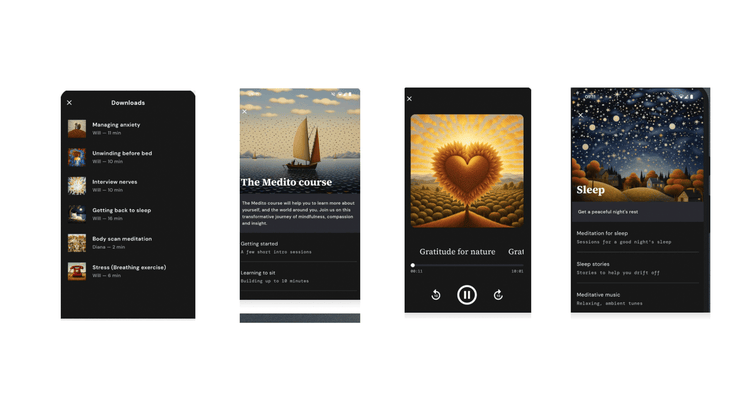
Most Simplistic (In a Good Way) User Experience
Medito
Get the App
⊕ Beautiful artwork
⊕ Diversity among teachers and meditation types, including anti-racism meditation series
⊕ Simple and easy to use
⊗ Few meditations longer than 20 minutes
⊗ Basic user interface
Costs: Free
Medito gives users what many other apps offer but at no cost—and it plans to keep it that way. Its tagline reads, “Made for people, not for profit,” and the creators strongly believe in the meditation app being a “free forever” service. (If you’re curious how the teachers who share their talent are supported, there is a non-intrusive option to donate in support of the app and its teachers.)
The lack of cost doesn’t take away from the user interface. It’s an inviting vibe with a library organized by themes, which range from anti-racism to a series for university students. Regularly offered 30-day challenges, community boards, and an active Instagram presence enable real life connections amongst users.
How we tested
Apps tested: 26
Number of testers: 13
Length of time tested: 2 weeks
Meditation experience of testers: From 0 minutes to thousands of hours
We selected an array of meditators across North America. Some have been meditating for decades. Some have never meditated a minute in their life. We asked everyone to try two different app multiple times a week each for two weeks to see if the honeymoon phase would endure.
Lastly, everyone was asked to share their experiences and rate the app on a variety of functions, including user interface, diversity of classes and teachers, special features, affordability, and more. Then we sorted through all the (very mindful) feedback.
Meet Our Testers
Jessica Miller, meditation teacher
D Javi Vason, yoga teacher
Hailey Kinter, yoga teacher
Jeneen Engle, party planner and coach
Sarah Ezrin, yoga teacher
Ben Karetny, first time meditator, contributor’s husband
Jodie-Ann Muckler, MSW, SCC, TS
Pattie Ficcorilli, occasional meditator
Zachary Ficcorilli, prep cook and continuous learner
Matt Londraville, talent acquisition partner
Lauren Waymouth, occasional musician
Joshua Albright, musician
Justin Ayers, recruiter
Learn more about the basics of meditation and how to adjust it to your needs with our other related content.


